INVEST Pitch Perfect Spotlight: How Pear Suite Makes Sure Community Health Workers Get Paid
INVEST Pitch Perfect Spotlight: How Pear Suite Makes Sure Community Health Workers Get Paid
Pear Suite recently won the payer/provider technology track of MedCity News’ INVEST Pitch Perfect contest. The startup provides a software platform for community health workers that helps them share data, submit claims and maintain compliance.
In the past decade, the healthcare industry has finally started to acknowledge the vital role of community health workers. For instance, about half of states(Opens in a new window) now reimburse community health worker services through Medicaid, and Medicare added community health worker services to its physician fee schedule for the first time ever last year.
But without the right tools, community health workers are often unable to secure these new payments. This is because they’ve never been contracted with health plans, accepted referrals, submitted claims, or needed to meet the complex compliance requirements of the greater healthcare system.
A Los Angeles-based startup named Pear Suite(Opens in a new window) is on a mission to solve this very problem. Two weeks ago, a panel of three venture capitalist judges crowned the company the winner of the payer/provider technology track of MedCity News’ INVEST Pitch Perfect contest(Opens in a new window), favoring it over five other startups in the space.
“Pear Suite turns community health workers into a scalable engine for value-based care — hitting the holy grail of healthcare: better outcomes, lower costs, broader access,” said Rohit Nuwal, partner at TELUS Global Ventures(Opens in a new window) and one of the contest’s judges.
The U.S. contains about 4 million community health workers, and their labor is a key part of addressing social determinants of health like food security, housing and transportation, pointed out Colby Takeda, CEO of Pear Suite.
Takeda defines community health workers as frontline workers who act as a trusted liaison between communities and the healthcare system, helping people navigate care, access resources and address social needs. The workers tend to bring their lived experience to the table, which can make patients feel more comfortable interacting with the healthcare system, he explained.
“They’re the frontline public health superheroes that are addressing health and social challenges. Sometimes they’re called doulas, care coordinators, navigators or health advocates. They kind of go by many different names,” Takeda remarked.
To continue reading this article, Click Here.
